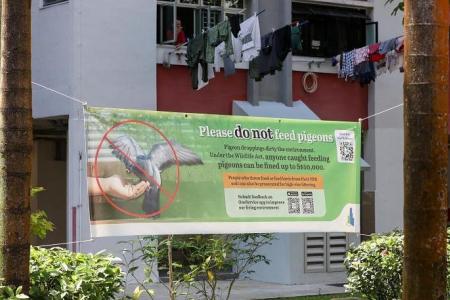Pigeon control efforts to be stepped up at 3 neighbourhoods
Pigeon control at three adjacent constituencies will be ramped up over the next six months, with various government agencies and town councils taking more measures to bring down the numbers of wild pigeons there.
The initiative, carried out at the Ang Mo Kio, Bishan-Toa Payoh and Tanjong Pagar Town Council areas, will run from June to December 2024.
Under the plan, the National Environment Agency (NEA), Singapore Food Agency (SFA) and National Parks Board (NParks) will work with the three town councils on a variety of measures to reduce numbers of rock pigeons – one of four species of pest birds in Singapore. These birds are not native to the Republic.
These include stepping up measures to improve rubbish and food waste management at bin centres and food establishments, and conducting outreach programmes to educate residents about not feeding birds. Pigeons will also be trapped and humanely euthanised under the pilot.
The three town council areas were chosen for their high pigeon populations and proximity to each other. The initiative aims to bring pigeon numbers down to manageable levels across the three constituencies. The authorities would not be drawn on what such numbers could look like.
When queried about the current pigeon populations across the three locations, NParks said only there were “numerous clusters exceeding 100 pigeons” in each of the selected regions.
By rolling out pigeon control measures across the three connected town council areas instead of carrying them out in just one area, the “spillover” effect – when pigeons fly from one area to another – can be reduced, said the authorities in a statement.
While there are no studies assessing how far rock pigeons usually fly in a day, studies of pigeon populations in America have shown that a pigeon’s home range typically spans a radius of 2.5km, said Mr Movin Nyanasengeran, vice-president of the Bird Society Singapore.
He told The Straits Times that coordinating efforts across the different town council areas could enhance the effectiveness of pigeon control initiatives.
“A more coordinated approach... would likely be more impactful. The pigeons don’t respect town council boundaries – they’ll move across all the nearby areas looking for food,” he said.
Mr Movin added: “If done well, they could reduce the number of pigeons in these areas because pigeons will soon enough realise that there aren’t as many opportunities to feed in these places anymore.”
A key prong of the action plan involves NEA and SFA working with the three town councils as well as other stakeholders, such as the Hawkers’ Associations, managing agent, operators of food shops, and cleaning contractors, to step up efforts to improve refuse and food waste management at bin centres and food establishments, said the authorities in a joint statement on June 25.
“These include ensuring prompt clearance of food waste, trays and dirty crockery at tray return racks and refuse bins. This would help to reduce human-generated food sources which attract pigeons,” the statement said.
A 2021 study done by NParks had found that 70 per cent of food consumed by feral pigeons were from human sources. This is said to be a key driver of pigeon population growth.
The study also found that withholding food availability of wild pigeons could reduce the number of chicks.
Using the circuit breaker as a natural experiment, as dining out was prohibited during the period to stop the spread of Covid-19, the NParks researchers found that during that period, feral pigeons spent more time foraging instead of resting – this led to a decline in their overall reproductive capacity.
Rock pigeons have a lifespan of four or five years, and can multiply up to six times a year.
A separate population survey by NParks also identified pigeon hot spots, showing higher pigeon density in areas with dense infrastructure, such as Housing Board estates.
With access to food sources being a major factor influencing pigeon populations, the authorities said they will increase efforts to limit the birds’ access to these sources.
This will be done concurrently with existing measures being undertaken to control pigeon populations, such as the use of netting and bird spikes to prevent pigeons from roosting in areas like in hawker centres.
Enforcement action will continue to be taken against people who litter or feed birds, they added. Under the Wildlife Act, those found guilty of feeding any wild bird face fines of up to $10,000.
Under the action plan, NParks will also conduct community outreach programmes and school initiatives to educate the public on proper food disposal practices and discourage feeding pigeons, crucial steps in managing their population growth.
Culling of pigeons will also be necessary, the authorities said.
“The removal of pigeons is required to complement food source reduction measures to bring the number of pigeons down and prevent exponential growth, especially in the near term,” said NParks, NEA, SFA and the town councils in the joint statement.
“Direct population control” measures will continue to be carried out in a “humane” manner, such as through euthanasia by carbon dioxide. Contractors will receive guidelines and optional opportunities to attend wildlife management training courses offered by NParks, although participation is not mandatory.
Ms Anbrasi Boopal, co-chief executive of wildlife rescue group Animal Concerns Research and Education Society (Acres), said: “Studies on methods employed have also proven that culling alone will not be effective, and will actually worsen the problem if the root cause (of human-provided food) is not addressed.”
Ms Boopal added that Acres advocates against inhumane methods of population control such as poisoning with alpha-chloralose, which impairs the birds’ ability to regulate their body temperature and overall function.
The results of the pilot will be assessed in early 2025. If found to be effective, it will be considered for islandwide implementation.
Get The New Paper on your phone with the free TNP app. Download from the Apple App Store or Google Play Store now

